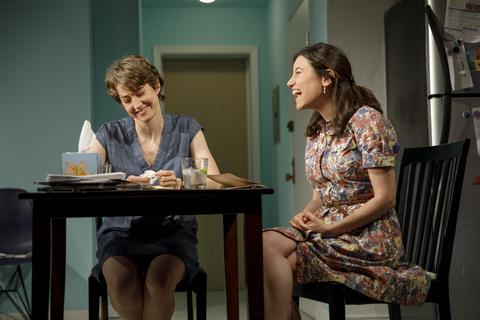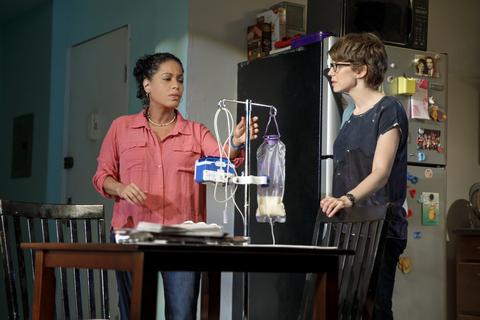Mary Jane
It’s hard to decipher author Amy Herzog’s intentions in this play which concerns the mother of a prematurely born baby, a baby we never see.

Carrie Coon and Susan Pourfar in a scene from “Mary Jane” (Photo credit: Joan Marcus)
[avatar user=”David Kaufman” size=”96″ align=”left”] David Kaufman, Critic[/avatar]Though it’s built around a dramatic subject, Amy Herzog’s new play proves as bland as its title. Under the circumstances, it’s hard to decipher Herzog’s intentions with Mary Jane, which concerns the mother of a prematurely born baby, a baby we never see, even though his presence is felt throughout the play. As surefire as Herzog’s ambitions were with her earlier plays 4,000 Miles and Belleville, she seems uncertain about her feelings toward her title character in Mary Jane.
As written by Herzog and staged by director Anne Kauffman, the play unfolds with a gritty realism, made all the more real by Laura Jellinek’s detailed scenic design and Leah Gelpe’s sound design. Indeed, it’s the constant blings of the offstage medical machinery keeping Mary Jane’s two-year-old son Alex alive (following his birth when he was only 25 weeks old) that make him so much of a presence. And as we learn, Alex not only has cerebral palsy but also “seizure disorder and lung disease.” Add to that that he can’t make any noise because “one of his vocal cords is paralyzed.”
Set for the first half in Mary Jane’s apartment in Queens, in the opening scene, Ruthie, her super, is unclogging the kitchen sink when she refers to her tenant’s “dealing with” something momentous. This is the first inkling we get that the “very nice, very pleasant” Mary Jane has a problem she seems to be avoiding. But she’s not avoiding Alex or the constant care and attention he requires, so much as she’s avoiding the pain and anguish the situation calls for, and always acting cheerful. Mary Jane even makes excuses for the husband who left her to deal with the situation on her own.
Is Mary Jane’s stoicism a legitimate response to the circumstances of her life, or is it a self-destructive path to even greater calamity? As Ruthie also tells her, “You seem to be someone who’s carrying a lot of tension in her body,” and not releasing tension is “how my sister got cancer.”

Liza Colón-Zayas and Carrie Coon in a scene from “Mary Jane” (Photo credit: Joan Marcus)
The ambiguities in Mary Jane’s character seem to stem more from the writing than the acting: though her behavior remains dubious or questionable, Mary Jane comes to real life as enacted by Carrie Coon, who was such a memorable Honey in the recent Broadway revival of Who’s Afraid of Virginia Woolf? She’s a solid Mary Jane as well, but then, the character and her motives prove harder to pin down. The stalwart New York actress Brenda Wehle is a perfectly believable and no-nonsense Ruthie. The always reliable Liza Colón-Zayas is Alex’s caregiver Sherry, and Danaya Esperanza and Susan Pourfar are persuasive as, respectively Sherry’s niece and another mother with similar challenges.
Along with the set that transforms itself in only a moment to take us to the hospital where Alex is now stationed, the intermission-less play also takes a sharp turn in the second part, when only Coon remains the same character. Wehle becomes a hospital chaplain advising Mary Jane, Pourfar a Hasidic mother of seven, and Esperanza a music therapist.
While all of the performers continue–like the sets and the direction–to obtain a heightened realism, in the end Mary Jane just feels muddled and inconclusive, or like a play in search of a meaning.
Mary Jane (through October 29, 2017)
New York Theatre Workshop, 79 East 4th Street, in Manhattan
For tickets, 212-460-5475 or http://www.nytw.org
Running time: 95 minutes with no intermission






Leave a comment